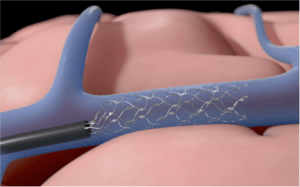
The Stentrode brain-computer interface (BCI) has successfully been demonstrated by researchers to help patients with severe paralysis complete tasks such as texting, emailing, shopping and online banking, in a new study. The BCI does this without the need for open brain surgery.
The study, published in the Journal of NeuroInterventional Surgery, was the first in-human study of the device. The implantation is similar to that of a pacemaker, entering through blood vessels.
Patients used the Stentrode neuroprosthesis to control a Microsoft Windows 10 operating system with eye-tracker movements to cursor navigation. Subjects also used machine learning-assisted training to control multiple mouse-click actions such as zoom and left click.
Thomas Oxley, Mount Sinai Hospital, New York, USA, and CEO of Synchron, a neurovascular bioelectronics medicine company which is responsible for this research, commented, “This is a breakthrough moment for the field of brain-computer interfaces. We are excited to report that we have delivered a fully implantable, take home, wireless technology that does not require open brain surgery, which functions to restore freedoms for people with severe disability.”












